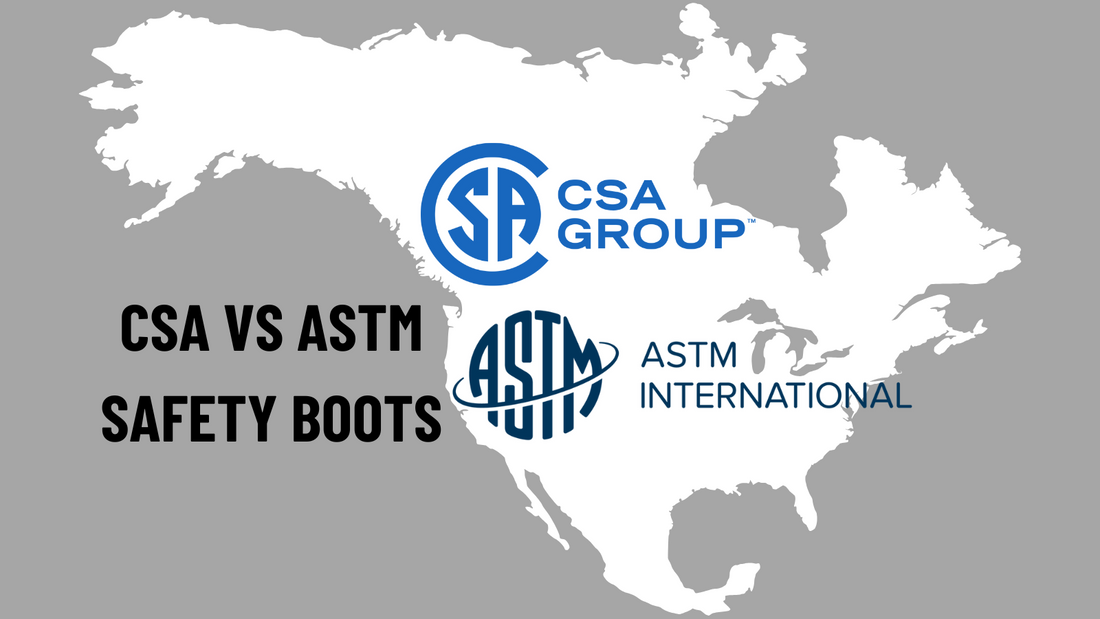If you’re working in North America, you’ve likely come across two major footwear certifications: CSA (Canada) and ASTM (United States). Both are recognized safety standards, but they are not interchangeable.
In this article, we’ll break down:
- The key differences between CSA and ASTM
- Which one you need for your job
- Why Canadian workers should always choose CSA approved boots
What Is CSA?
CSA (Canadian Standards Association) is Canada’s official regulatory body for safety equipment, including protective footwear. CSA Z195 is the current footwear standard, and it includes requirements for:
- Toe impact resistance
- Sole puncture resistance
- Electric shock protection (ESR)
- Sole material and construction
- Standardized symbol labeling for easy identification (e.g., Green Triangle, White Square)
Boots certified by CSA must carry these specific coloured symbols, which allow inspectors and employers to immediately verify compliance.
For a full breakdown of CSA symbols, protection levels, and how to choose the right boots for your jobsite, read our Ultimate CSA Work Boot Guide.
What Is ASTM?
ASTM International is a U.S.-based organization that publishes global standards for many industries. ASTM F2413 is the relevant footwear standard in the United States.
ASTM-certified boots are tested for:
- Toe impact and compression
- Puncture resistance
- Electrical hazard (EH) resistance
- Static dissipative and conductive properties
Unlike CSA, ASTM does not use colour-coded symbols. Instead, ASTM certification is usually printed as a text string inside the boot (e.g., "ASTM F2413-18 M/I/C EH").
For an in-depth look at what ASTM F2413 covers and why it matters in protective footwear, check out our article: What Is ASTM F2413?
Key Differences Between CSA and ASTM Boots
| Feature | CSA (Canada) | ASTM (USA) |
|---|---|---|
| Governing Body | Canadian Standards Association | ASTM International (U.S.) |
| Certification Marking | Color-coded symbols | Text code (e.g., ASTM F2413-18) |
| Required in Canadian Jobsites | Yes (especially federally & provincially regulated) | No (unless employer accepts) |
| Electric Hazard (EH) Rating | ESR (white square with Ω) | EH printed in code |
| Toe Cap Grades | Grade 1 or Grade 2 | Impact/compression I/75, C/75 |
| Common Use Region | Canada | United States |
In Canada, even a perfectly good ASTM boot may not be accepted on regulated job sites unless it also carries CSA approval. it’s more about regulatory compliance, than quality. Many ASTM boots meet or exceed performance of CSA boots, but Canada legally enforces specific markings and compliance to CSA Z195.
Can You Wear ASTM Boots in Canada?
In most cases: No.
Canadian laws and jobsite regulations typically require CSA Z195-certified boots. Even if an ASTM boot has all the right features, it won’t pass a safety inspection unless it has CSA labels.
However, there are a few rare cases (e.g., dual-certified products or private job sites) where employers may accept ASTM, but this is the exception, not the rule.
When Might ASTM Be Acceptable?
- You’re working only in the U.S.
- You’re employed by a U.S.-based company doing short-term work in Canada with employer approval
- You’re buying for personal use or non-regulated environments
Still, if you plan to work in Canada—even part-time—make sure your boots meet CSA Z195. The safest option is a pair certified to both CSA and ASTM standards.
Dual Certification: Best of Both Worlds?
Some boots are tested and certified for both CSA Z195 and ASTM F2413 standards. These often show both text and symbol-based markings and are ideal for cross-border work.
At MooseLog, every boot is dual-certified to CSA Z195 and ASTM F2413 standards, ensuring full compliance on both Canadian and U.S. jobsites.
Choosing the Right Boots
If you work in Canada, especially in construction, manufacturing, warehousing, or electrical trades, CSA approved boots are your only safe choice.
For U.S.-based work or dual-location roles, consider dual-certified models—but never assume ASTM = CSA.
MooseLog offers a full line of CSA & ASTM dual certified work boots for men and women, trusted by workers across North America.










